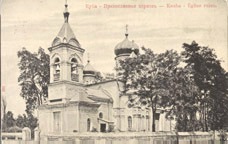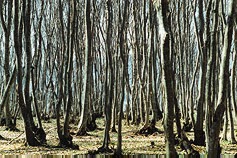|
Summer 1998 (6.2) The Mountain Jews of Guba by Inga Saffron
KRASNAYA SLOBODA, Azerbaijan-Just before dusk on a Friday evening in this Caucasian mountain village, the tea garden shut its gate, the boys selling flat circles of bread deserted their street-corner posts, the swallows began circling the cupola of the synagogue, and men donned fedoras and rushed down the narrow streets to say their prayers. Entering the vestibule of the century-old Bet Knesset synagogue, they did something no other Jews in the world do: they removed their shoes and padded into an open sanctuary that resembled a mosque and was laid from end to end with handmade oriental carpets. None of the local men carried a prayer book. None could read Hebrew, not even the rabbi. The words they chanted without understanding their meaning had been passed on to them by their fathers and committed to memory. Women, barred from the service, peered in through the windows, along with a clutch of girls coming from Hebrew school run by Israeli Jews. The people living in the Turkish-style houses perched on this gentle hillside are a distinct ethnic group called Mountain Jews, the remnants of an obscure Jewish community that managed to survive intact through 2,000 years of Persian, Turkish, Russian and Soviet rule. Unlike the more European, Ashkenazi Jews of the former Soviet Union, who largely stopped practicing religion, Mountain Jews clung as tenaciously to their faith as their villages have clung to the rocky Caucasus terrain. Over the years, they borrowed customs from their amiable Muslim neighbors, but never assimilated. Even as their knowledge of the rituals seeped away, they adhered to the broad outlines of Judaism, faithfully attending Sabbath prayers, scrubbing their homes on Fridays, baking their own matzo on Passover and eschewing pork. "We always went to synagogue. We always celebrated Passover. We always knew we were Jews," said Boris Semyonov, 64, the town's elected Jewish elder, or gabbai, as he greeted men arriving for prayers in the gathering twilight.
Guba is known for its forests. About 5,600 people live here in the Mountain Jews' capital, Krasnaya Sloboda, which may be the only all-Jewish town left in that long arc of East European territory known as the Pale, which brushed against Azerbaijan and was once dotted with shtetls [small town communities]. "There are only two places in the world where Jews live together like this, in Israel and here," said David Ben Yusef, 63, once the town's Communist Party boss and now the local administrator. "This place has always been, and will always be, a Jewish place." On the dirt lanes where people gossip under Turkish balconies, in front of the new kiosk in the village square, or in the weedy garden of the town hall-where the local Lenin statue has been unceremoniously dumped-every single person is a Jew and everyone speaks a Persian-derived language called Tat. Where the Mountain Jews came from is a source of much scholarly speculation. Many of these Jews, who sometimes call themselves Juhuro, insist that they are descendants of Israel's Lost Tribes who began their wanderings after the destruction of Jerusalem's first temple in 722 B.C. Others say the Juhuro migrated north from Persia a mere 300 years ago, at the invitation of a local khan, or chieftain and were cut off from their cousins in Iran as the borders of empires shifted. An altogether different theory suggests that the Juhuro are what remains of the mighty Khazar nation, an indigenous Caucasian people who converted en masse to Judaism in the eighth century, in a vain attempt to fend off Christian Russians and Islamic Arabs. In appearance, the Juhuro are indistinguishable from their Azeri neighbors, who are themselves a mix of Turkish, Persian, Arab and Caucasian stock. Before the arrival of communism, Krasnaya Sloboda was a self-contained Jewish town that boasted 11 synagogues. The Soviets closed all but one and turned the town into the headquarters of a local collective farm. As a child, said Ishai Ben Mordukai, 69, his family kept pigs so they wouldn't be suspected of following their religion. "We had to learn all the prayers by heart because we couldn't have Hebrew books," he said. Whatever their exact origins, Mountain Jews -like many of the Caucasus' Muslim ethnic groups-have become zealously strict about certain religious tenets. Many women here are obligated to wear head scarves. There is no women's section in the Juhuro' synagogue, here or at the one in more cosmopolitan Baku, although there is talk of introducing such an innovation. Religious men do not shake women's hands. And while the Juhuro do not yet have a kosher butcher here, they did raise money to build a new mikvah, a ritual cleansing bath for women. "Among all the Jews of the Soviet Union, only ours kept the religion, and because of us, the religion is being resurrected," said Semyon Ikhilov, who was born in Krasnaya Sloboda, but is now the gabbai of Baku. "Not one day was spent without praying to God. On the eighth day, male babies were always circumcised, even if the next day their parents were summoned to the KGB." Yet, when a 19th-century Russian historian visited the area, he found that the Mountain Jews had a relatively hazy notion of their religion. They cleaned their homes every Friday in advance of the Jewish Sabbath and showed a preference for ancient Hebrew names, but they also revered guests in the ways of Muslim Caucasians, and washed the feet of visitors. Like the local Muslims, and some Sephardic Jews, the Mountain Jews always decorated their synagogues with carpets. They also removed their shoes before entering. "It's obligatory," explained Semyonov, the gabbai in Krasnaya Sloboda, who was surprised to learn that most other Jews don't have the same custom. "What if a guy goes into a loo and then he goes into a synagogue?" Even in isolated settlements, Mountain Jews had plenty of contact with local Muslims, and usually spoke fluent Azeri. Across the river from Krasnaya Sloboda is its fraternal twin, the Muslim town of Kuba, famed for its carpets. Kuba's mosque nestles on the bank, directly across from the Bet Knesset synagogue, as if the two were engaged in an endless religious dialogue. Many Jews cross the river to work in Kuba, and more are settling there. For all the Juhuro' strictness about observing the Sabbath, evening services are as much a town meeting as a religious event. Sliding into the hard pews, the men exchanged the day's news, chatting while a rabbi visiting from Israel intoned in Hebrew. Along the edge of the synagogue,
dressed in the austere black of Orthodox Hasidim, sat the newest
residents of Krasnaya Sloboda: Jews from Israel who have come
to persuade the Juhuro to emigrate. Every emigrant is mourned now. "It's sad, not only because they've lived here a long time, but because they're leaving behind their dead and their houses," said Semyon Ikhilov, the Baku gabbai. Perhaps because so many Mountain Jews consider the Caucasus their homeland, they have ambivalent feelings about Israel. They say they feel comfortable in Azerbaijan. "We have the same food, the same music," Ikhilov said. President Heydar Aliyev has visited the Juhuro synagogue in Baku, and his portrait hangs in the office. "Every year my father raises his glass and says, 'Next year in Jerusalem,'" Ikhilov said. "But my father was well-known here, and I'm well-known here. I went to Israel. I liked it. It's beautiful. I'd like to go again. But our home is here. We aren't going anywhere." There are signs that some emigrants are returning to Krasnaya Sloboda, at least part time. Having made money in Israel, they are investing in the construction of lavish new homes, many with windows in the shape of a Star of David. When the summer light has faded, and the Friday prayer service is over, men in Krasnaya Sloboda's synagogue slip back into their shoes and walk outside. Their daughters and wives are waiting for them, shouting a greeting that Jews everywhere have always used: "Shabot Shalom." Inga Saffron is a staff writer
with the Philadelphia Inquirer. |


